I wore a paper crown. Thick glasses concealed crossed eyes. My head tipped away from my mother, she who pretended everything was fine.
Just five, I felt cornered by a dark threat I couldn’t see or name. My parents didn’t discuss what we all felt. I didn’t know how to say, “I’m afraid.”
When I was ten, I began naming the feeling, at least to myself. By twelve, I knew death lurked around my dad. My parents kept their silent secrets as Darkness closed in. Dad turned yellow with jaundice and died when I was fourteen.
I didn’t know the myth of Persephone then. I hadn’t heard of the Underworld or the Great Below. I didn’t know Persephone’s mother Demeter mourned for her lost daughter and found a way to win her part-time release. I didn’t know Hecate and Hermes helped with the rescue.
Would I have recognized my own experience if I had been told Persephone’s story? Would it have helped me understand the threat–not rationally, but in a mythic way, in the language of image and soul?
***
Persephone, the maiden goddess of ancient Greece and her friends picked flowers in the Elysian Fields. I imagine her carefree and innocent, unaware of the threat as she reached for a beautiful narcissus. Suddenly, from deep below, from all around with no escape, a dark force snatched the girl into a black chariot and carried her to the Great Unknown.
She was abducted by Hades (not to be confused with the Christian definition of that term). Some translations say she was raped. Others say she went willingly. A better translation for the word raped might be “taken,” but still…
She was forced into darkness when all she wanted was light.
We’ve all been seized by helplessness and despair. For some, there is no escape. I think of those who live in war zones or with severe mental illness. It think of those who live with crippling disease or broken children. Like most of us, I’ve suffered periods of depression and despair. I’ve felt trapped and lost, confused and hopeless. Abduction by darkness showed up in many forms.
If I had heard Persephone’s story as a girl, I would have known she became Queen of the Underworld and a Guide to Souls. I would have known she was rescued to return each year with spring and the gift of life. I would have understood something about nature’s cycles of birth, fertility, death, and rebirth. I imagine it would have helped.
I didn’t know it was possible to keep one foot in the world of darkness and the other in the light. I didn’t know I would find wisdom in that darkness. And even comfort.
Now I know.
***
Were you introduced to mythology or old original fairy tales as a child or, like me, were you fed the Disney versions of the darker tales? Which stories stuck with you? Have you revisited them as an adult? Have you read these stories to children? After my brother’s death, I re-read Persephone’s story. Since my mother-in-law is one hundred, I know I’m not done accompanying people at the end of life. For other articles about goddess myths, see Nature, Mythology, and Healing: Daphne Meets the Green Man and Listening to the Dark.
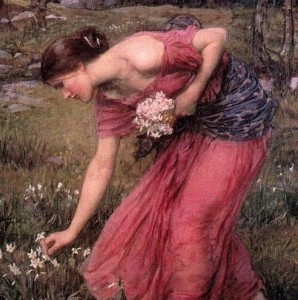
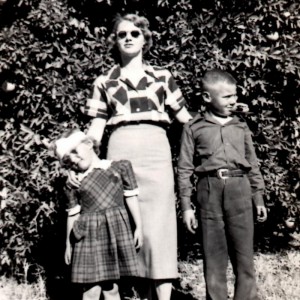
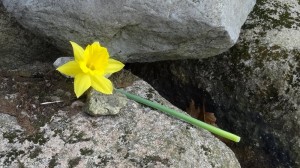
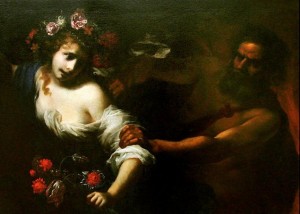
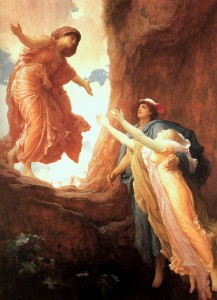
I think even children can sense when a story is archetypal, i.e. universally relevant. Every psyche knows what it is like to feel fear, hope, despair and so on. Bruno Bettelheim, a child psychologist and mythologist, says that many people in Nazi prison camps found hope in the old fairytales and myths they were taught as children. These stories said things like, yes, there are people bigger than you who might hurt you. Yes, there are times when bad things happen to good people. Yes, sometimes innocent people are taken advantage of by evil people, but ultimately, good will win over evil. Myths and fairytales may not be true on the outside, but they are true on the inside, at the level of soul. And as you and I know full well, we can all be healed by seeing our own stories in them. Thank you for reminding us of this helpful, healing reality.
Jeanie, your comment makes me think of my three-year-old son Anthony lying on the floor with headphones, listening over and over to the opera Hansel and Gretel by Engelbert Humperdinck. He couldn’t get enough of it. It was the real deal, the full story of dark and light. (Headphones needed to keep his parents from going stark-raving mad with the repetition.)
I also remember reading stories to Vic from a book of Italian fairytales I bought for his birthday. Like Grimm’s Fairytales, some did not end well and good did not prevail over evil. Maybe that needed to be learned, too, but we didn’t re-read those. No matter how hard the initiation, it was always nice to have a positive ending.
Oh my gosh I LOVE this post. And the illustrations. My Marika was into mythology and I intend to learn more myths. I’d known of Persephone. But you made her come alive for me. Many thanks, Elaine.
Thank you, Robin. I love those old paintings that can be used because no one has a copyright anymore. There are many Persephone books for children with beautiful illustrations. And of course there is googling any myth and finding tons of information.
So Marika isn’t done leading you into new territory. I don’t expect that part of your relationship to ever end.
Thanks Elaine for reminding us of the value of myth. If I’d known of these stories as a younger person, perhaps – perhaps what? I don’t know. I do know that I find the myths especially relevant now in my older age. Dark forces happen at the most inopportune time it seems. All I know is that they must be endured and that the darkness doesn’t live forever if it is acknowledged fully. It wants a little light thrown upon it even if the shadows seem frightening. Myths help us in a significant way as do contemporary real life stories of the psyche.
I’m trying to remember what story impressed me as a young child. Probably Sleeping Beauty, and other Hans Christian Andersen stories where there was a happy ending! The Grimm stories are more realistic. I love reading about other interpretations of fairy tales such as Von Franz eg where I cast an adult eye on them. My children grew up on Roald Dahl, wonderfully dark as are his adult tales … and the fairy tales of Oscar Wilde inter alia.
The Ugly Duckling was a favorite as a child–because I felt like one (like lots of us). Also Cinderella. I remember the bright vinyl record I had of the Disney music.
I also love von Franz’s work with fairytales from an adult perspective. One of my favorite things about Marion Woodman’s week-long BodySoul Rhythm Workshops and her two-day workshops at University of Toronto was her use of fairytales or myths to structure ideas and creative work. She introduced me to stories I hadn’t known before.
I will always love ‘Til We Have Faces by C.S. Lewis, his telling of the Eros and Psyche myth. My mythology class spent years on Eros and Psyche. Rich and full, dark and light with a happy ending.
If I remember correctly it was your suggestion that I got CS Lewis Til we have faces – I read it on my kindle while in Turkey Sept 2014 – was entranced … I imagine I could read it again. I’m recalling some of the images as I write …
Yup, I suggested ‘Till We Have Faces.’ It’s still selling well after being published in 1980. A classic. A friend of mine gave me the book soon after it came out. A few years later, my mythology group studied the Eros and Psyche myth for two years. We dug through every image in those four labors! Then Marion Woodman used ‘Till We Have Faces’ as the text in a week long workshop focused on Eros and Psyche. Of course, she revealed gems I had missed.
I have nothing profound to say here except to notice that your mother looks blinded to reality by wearing dark glasses. You probably noticed that too.
It’s in childhood we discover the meaning of light and dark, good and evil. I know I did in the fairy tales my teacher/aunt read to me. I especially remember a story with a green troll who lived under a stone bridge. The bridge seemed to confine the evil while making it more ominous, a paradox.
I’m drawn to Pre-Raphaelite paintings also. They seem to speak of other worldly sensations you must have felt in the childhood you describe. Like Anthony, our Joel could not get enough of a sound recording of Hansel and Gretel. He listened to it over and over and felt the horror, knowing he was safe.
Both our kids loved that record? That’s interesting. My son listened around 1977-78. Was it the same time period for Joel?
My mom loved her “looking way out there in the distance” pose. It drove me crazy. Her attempt to be Katheryn Hepburn instead of Iva May Ware. Yes, blinded to reality.
Your trolls sound like the guy under the bridge in the Three Billy Goats Gruff. I agree about those pre-Raphaelite other worldly paintings. Lots of longing.
You call that nothing profound? You’re amazing, Marian.
Close – Joel was born in 1971 and would have been 6 or 7, so yes it was the same time period. He had a little boxed set with teeny record and booklet I think.
David was born in 1970. I’m with him in North Carolina right now–and he just did a big computer update and gave me more storage space for the constant stream of new photos. Like all the rest of life, housecleaning and discarding needed. You’re my inspiration.
I knew nothing about mythology until I took a Humanities course through my high school years, and then became fascinated with Greek mythology.
As for fairytales, sadly, nobody read me any. As soon as I learned to read I became fascinated with all the childhood favourites: Snowwhite, Rapunzel, Cinderella. I remember how reading Little Red Riding Hood and Hansel and Gretel used to scare me.
You’ve been a survivor for a long time, Debby. Sounds like you fed yourself solid teaching stories as a kid and on it went from there.
Greek mythology is rich and complicated, but every time I dig around, I come up with something valuable.
We could spend a lifetime reading Greek mythology if we had the time. I still find it fascinating and enjoyed this post about Persephone’s story too. 🙂
Thinking of Aquileanea’s immersion in Greek Mythology. It’s her work. You have other places to focus.
That sweet Aquileana is certainly amazing with the depth of research she puts into her educational blogs on mythology. 🙂
I agree Aquileana does wonderful research and work in Greek mythology. I so admire her, Debby, and connected with her through your website. Thank you. In writing, I return to a “memoir” focus (so far) rather than trying to explain every detail of any one myth I’ve studied. I’m interested in learning these details for myself, reading what others have written about the myth, looking at it in cultural context, and then exploring the archetypal structures in myself. Ancient mythology teaches me about the deep human patterns that are both universal and particular to me.
Elaine, I believe children are the natural carriers of archetypal knowledge and symbolism…in their play, dreams, and larger than life feelings. The archetypes move through them freely. Even when the adults around them deny the larger influences, children dreams tell the stories of the influences moving beneath the surface of consciousness. That is why myth and fairy tale is so important to their healthy psychological development. Granddaughter Serene loves myths from around the world. I see the influences and her ability to integrate what she knows. For instance, her student teacher is a Muslim and explained Ramadan to her class this past week. Serene, who loves to eat, fasted all day the next day until sundown and told us why this was important to Muslims. She really respected her student teacher’s fortitude after just one day of fasting herself! Thank you for articulating this important perspective…that children, drawn into the larger events of life around them will find a way to cope better than being closed off from the natural cycles of life/death/rebirth. Hugs, Jenna
I agree, Jenna. My mom was busy protecting her two kids from understanding that Death was in the house. A close family friend treated me like a granddaughter and read me classics such as Anne of Green Gables, Heidi, and Little Women. They made a big impression, but I didn’t know a thing about mythology and the only fairytales were Disney.
Your granddaughters are remarkable. I’m moved by Serene’s willingness to fast for a day. Not easy for anyone much less a non-Muslim kid.
We all need to think about why it is that I am the only man making a comment on this post. Is it because men are afraid to read it in the first place? Or because they have no sufficient handle to talk about it in its own right? Or something else? My answer is that probably a little of both. It still needs to be a priority to get men to pay attention to the unconscious, rather than allow their lives to slip-slide away watching the Super Bowl for the 50th time.
Hi Skip. I appreciate your comment and perspective and will be thinking about it for a while. Only a few men comment on my blog and none of them regularly. I’m glad my sons read my blogs and so do you. My book has quite a few male reviewers on Amazon, but I imagine it is less than 1/4 of total reviewers. I didn’t count. Even when my pieces were posted at The Good Men’s Project, most comments were from women. That’s true of my TEDx comments, too. Hmmmm… But, in general, on any blog, you’ll find more women commenting and supporting each other in that female relational way.
Here’s another point which is particular to me. I write through a memoir lens and a woman’s experience. I haven’t put energy into telling men they’ll also find feminine archetype within themselves–and you make me wonder how I might do that. I agree it’s essential for men to turn toward self-understanding. I’m not a theoretical or conceptual writer like some of our mutual friends and accept that my personal approach appeals to women more than men. Maybe I shouldn’t be quite so accepting. I’ll keep chewing this, so thanks.
Dear Elaine,
Of course, I am not trying to pile onto you the human struggle of our age, which is to emerge into a new level of consciousness. That is beyond all of us, and may well take five to 10 centuries to accomplish. The best any of us can hope to do is provide pointers for others, especially the next generation. We are baton carriers in a relay of passing wisdom down the generations, which can ultimately lead humanity to a better attitude about living together on a shrinking planet.
My main purpose in comments like mine above is to sensitize your readers to the crying need to somehow enfold men more into this process, which has largely been carried on out of sight by courageous wise-women.
It is primarily for we elders to carry this effort further. While younger people may “get it” during college years, they are often sidetracked by the archetypal duties involved with propagation of species, as your article on being overwhelmed by the Mother Archetype attests. Once the kids are up and out, though, we elders have a chance to re-tool and serve another purpose. Unfortunately, I don’t think practicing analysts, who are involved with bringing people along one-on-one, can have sufficient impact. For them, after all, writing on Jungian topics and their relevance to modern life amounts to a busman’s holiday, when many are probably up to their snoot in unconscious issues sloshing about between their own psyches and those of their patients. (I respect but do not envy them their work, which must be quite challenging.) Therefore, it seems to me that is up to we informed elders to carry the effort forward, as you already do courageously on your blog.
I only hope we can engage more men into the ranks of these wise elders. Failing to do so only leaves men wallowing in the now out-dated patriarchal attitudes of the last two millennia, holding on to past attitudes, because they can see no way forward.
Best regards, Skip
I didn’t know much about Greek mythology until I got to college, and even then I learned just enough to understand T. S. Eliot’s poetry. I actually became acquainted with mythology in grad school when I studied the “myths and symbols” of American culture. Feminism also brought be examples of archetypes that really helped me locate myself and my desire to be an agent of my own destiny inside larger patterns and forces. There’s something very comforting about being able to see patterns that bring humans into a deeper relationship with nature and their own unconscious minds.
Shirley, I’m smiling at your example of learning enough mythology to understand T.S. Eliot. I had to learn enough mythology to understand the passages my philosophy teacher explored in Plotinus and Plato. I’ve loved Jung from the first moment I was introduced to his work in college. I was lucky to have a Jung focused teacher, that same philosophy teacher, who helped me dig into Jung’s work and the women Jungians who were writing in the 1970s. I craved the search for meaning, patterns, and understanding how the unconscious works. (Although this brings to mind a favorite Marion Woodman quote: “The Unconscious is REALLY unconscious.”) But if we get the patterns at work, there is a chance of understanding our own dark and light.
I appreciate your sensitivity to the unseen, but still felt world of myth. You find comfort and wisdom in myths as I did growing up listening to Christian myth. Thank you for sharing your personal pictures and stories of healing.
I grew up with Christian stories, Diana, but they were sparse in my Protestant and not religious family. I almost converted to Catholicism as a teenager because I was drawn to the Virgin Mary, but the priest in catechism class dismissed my questions, so I didn’t last long. Thank you for your kind comment.